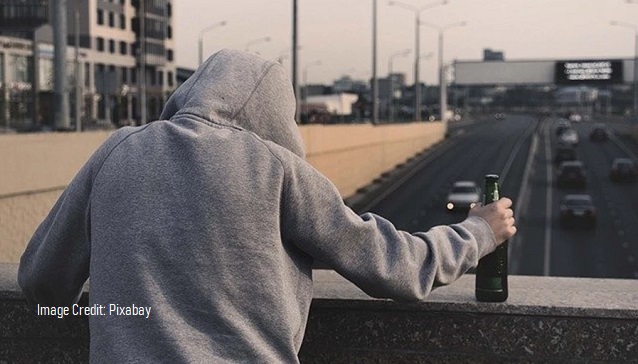San Francisco Sees More Overdose Deaths Than Covid Deaths in 2020

Data show alarming trends in drug overdoses and suicide as people—especially young people who are least at risk from COVID-19—are forcibly cut off from friends, families, and communities.
It’s quite likely that wherever you are reading this, you are currently subjected to lockdowns, restrictions, regulations, or executive orders to one degree or another, as government officials respond to the coronavirus pandemic with increasing coercion and control. Indeed, The Wall Street Journal reported on Wednesday that US states and cities have “imposed the most extensive restrictions on business and social gatherings” since the spring.
Many argue that these new restrictions are essential for slowing the current surge in coronavirus cases in certain areas, but some public health researchers have pointed out that lockdowns and related government orders that focus entirely on containing COVID-19 cases lead to worse public health outcomes in other areas. This collateral damage from lockdowns is already glaringly apparent. In particular, data show an alarming trend toward drug overdoses and suicide in 2020, as people—especially young people who are least at risk from COVID-19—are forcibly cut off from their friends, families, and communities.
More Drug Overdose Deaths During Lockdowns
The desperation is revealed in startling new statistics. According to the Associated Press, a total of 621 people have died of drug overdoses this year in San Francisco, compared to 173 deaths in the city from COVID-19. The number of San Francisco drug overdose deaths is up from 441 in 2019. California has enacted some of the strictest public health orders in the country this year, and is still seeing its cases rise.
One survey by YouGov found that 39 percent of respondents who were recovering from an addiction prior to lockdowns have relapsed. Other research shows increasing rates of drug and alcohol abuse in 2020, and the CDC reports that overdose deaths are accelerating during COVID-19.
Federal surveys show that 40 percent of Americans are now grappling with at least one mental health or drug-related problem.
Martin Kulldorff, a biostatistician and epidemiologist at Harvard Medical School, has been critical of widespread lockdowns since the beginning of the pandemic, warning that these coercive strategies would lead to other serious public health harms and increased mortality.
“The current lockdown strategy has led to many excess deaths, both from COVID-19 and from the collateral damage on other health outcomes,” Kulldorff recently told Newsweek. “A focused protection strategy, as outlined in the Great Barrington Declaration, would minimize disease and mortality by better protecting older and other high risk people while letting the young live near normal lives.”
Kulldorff also suggests that new data showing US excess deaths in 2020 for people ages 25-44 are mostly due to the collateral damage caused by lockdown policies.
In March-July 2020, ages 25-44, USA had 11,899 excess deaths compared to 2015-19, 38% from/with #COVID19 and 62% from collateral damage due to #lockdowns and excess fear. Article by @jeremyfaust @hmkyale @EMDocinTraining @Cleavon_MD @RWalensky et alhttps://t.co/JAUjKLg9cN
— Martin Kulldorff (@MartinKulldorff) December 20, 2020
Suicides Are Also Increasing in 2020
In addition to rising drug and alcohol abuse and overdose deaths, suicidal thoughts and attempts are also increasing this year. The Washington Post reports that depression and anxiety have surged since the arrival of the coronavirus.
“Federal surveys show that 40 percent of Americans are now grappling with at least one mental health or drug-related problem. But young adults have been hit harder than any other age group, with 75 percent struggling,” the Post reports. “Even more alarming, when the Centers for Disease Control and Prevention recently asked young adults if they had thought about killing themselves in the past 30 days, 1 in 4 said they had.”
The Post explains that we won’t have accurate data on suicide rates for 2020 until another couple of years, due to slow reporting mechanisms. But state and city data for some areas suggest disturbing suicide numbers this year, including in Oregon’s Columbia County where suicides by summertime had already exceeded the area’s 2019 total, and DuPage County near Chicago reports a 23 percent increase in suicides over last year. Other large counties in the US have seen similarly ominous trends, and in Japan, more people died of suicide in the month of October alone than have died from COVID-19 this entire year.
Holiday Civil Disobedience
As families weigh the trade-offs this holiday season between social isolation to slow the spread of coronavirus and the harms that this separation can cause, many of them are choosing to ignore public health warnings to avoid travel and holiday gatherings. The New York Times reports that millions of people have passed through airport security checkpoints this week, while The Wall Street Journal indicates that nearly 85 million Americans are expected to travel between Dec. 23 and Jan. 3, a decline of just under 30 percent from last year.
More families may be seeing the damage these lockdowns and related policies are causing their loved ones and are no longer willing to comply with draconian orders to stay away from others. Their decision may be made easier when they see public health officials and politicians personally violating the holiday travel and gathering warnings and rules they thrust on others.
COVID-19 should be taken seriously as a public health threat, but so too should the harms of lockdowns and government orders that are leading to record numbers of drug overdose deaths and suicides, along with other types of collateral damage such as rising global poverty and declining cancer screenings.
While public health and elected officials remain singularly focused on COVID-19, families gathering this holiday season recognize that ensuring the overall health and well-being of their loved ones extends beyond one virus.
COLUMN BY
Kerry McDonald
Kerry McDonald is a Senior Education Fellow at FEE and author of Unschooled: Raising Curious, Well-Educated Children Outside the Conventional Classroom (Chicago Review Press, 2019). She is also an adjunct scholar at The Cato Institute and a regular Forbes contributor. Kerry has a B.A. in economics from Bowdoin College and an M.Ed. in education policy from Harvard University. She lives in Cambridge, Massachusetts with her husband and four children. You can sign up for her weekly newsletter on parenting and education here.
EDITORS NOTE: This FEE column is republished with permission. ©All rights reserved.


